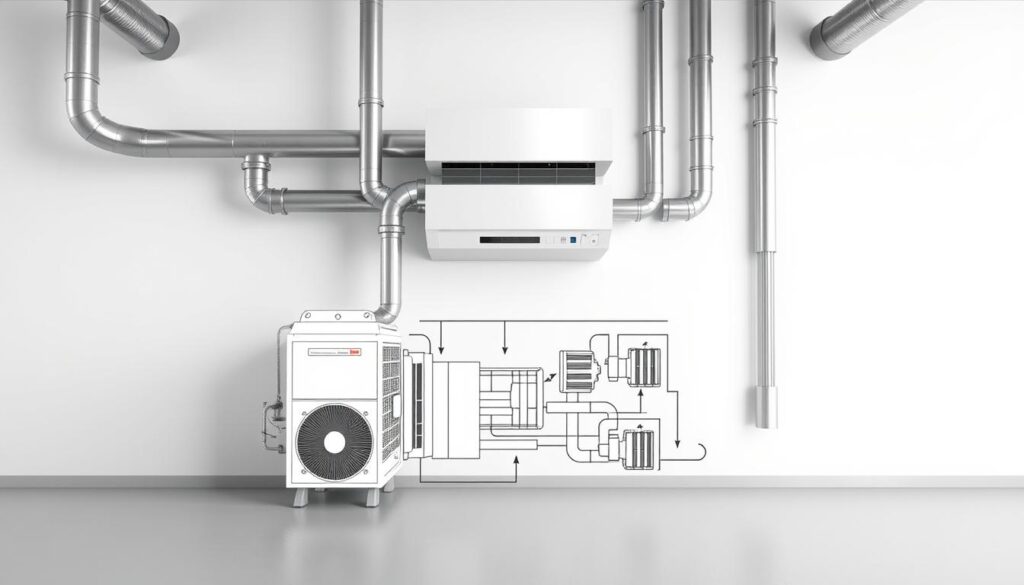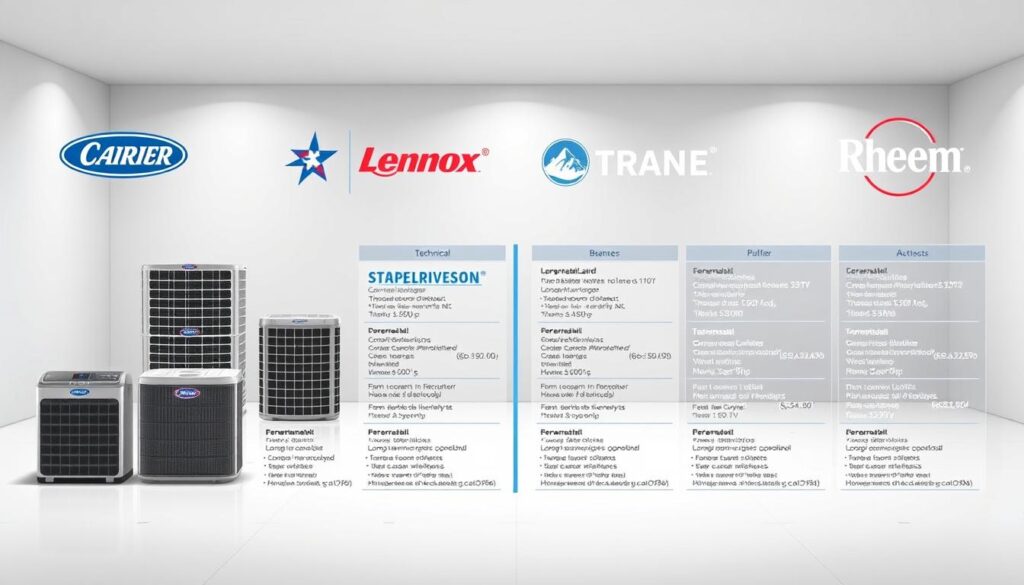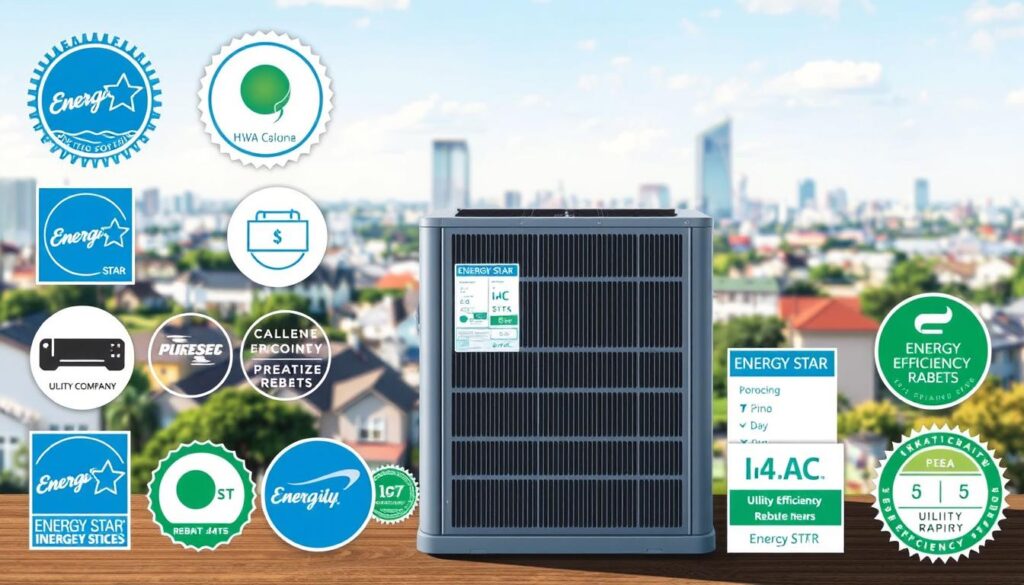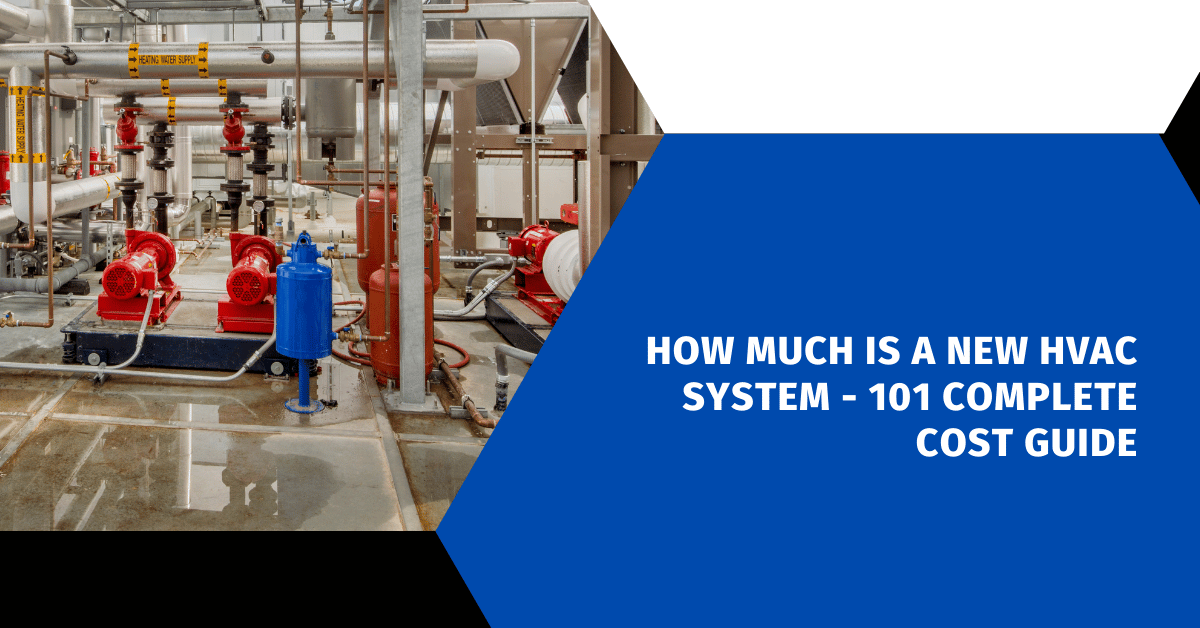Affiliate Disclosure
HVAC Guide Guys is a participant in the Amazon Services LLC Associates Program, an affiliate advertising program designed to provide a means for sites to earn advertising fees by advertising and linking to Amazon.
How Much Is a New HVAC System? Are you curious about the cost of a new HVAC system? Replacing your home’s heating and cooling can be pricey. Costs can range from $5,000 to $12,000, depending on several factors.

Knowing the cost of HVAC installation is key for homeowners looking to upgrade. This guide will cover all you need to know about pricing. We’ll look at system types and installation costs to help you make a smart choice.
Your home’s size, current setup, and specific needs will affect the cost of a new HVAC system. We’ll dive into the main factors that influence pricing. This will give you the insights you need to plan your budget.
Key Takeaways
- Average HVAC system replacement costs range from $5,000 to $12,000
- Multiple factors impact the total HVAC installation cost
- Home size and system type significantly influence pricing
- Professional assessment is key for accurate cost estimation
- Energy efficiency can help offset long-term expenses
Table of Contents
Understanding HVAC System Types and Basic Costs
Choosing the right HVAC system is key for comfort and saving on energy. Different systems have their own benefits and prices. This affects your ac unit replacement cost and overall central air conditioning cost.
Exploring HVAC options, you’ll find several main types. Each meets different heating and cooling needs. Knowing these systems helps you choose wisely.
Central Air Conditioning Systems
Central air systems are a top pick for consistent temperature control. They usually:
- Provide whole-house cooling
- Cost between $3,500 and $8,500
- Work best in homes with existing ductwork
- Offer efficient cooling for larger spaces
Heat Pump Systems
Heat pumps are great for both heating and cooling, perfect for mild climates. They are known for:
- Dual functionality for heating and cooling
- Price range of $4,000 to $10,000
- Higher energy efficiency compared to traditional systems
- Ideal for regions with mild winters
Gas Furnace Combinations
Gas furnace combinations are strong for heating and cooling, best in cold areas. Expect:
- Comprehensive temperature control
- Costs ranging from $6,000 to $12,000
- Reliable heating during extreme cold
- High efficiency with modern models
Your climate, home size, and budget will guide your HVAC choice.
Explore Our HVAC Shop
Looking for top-rated HVAC tools, parts, and accessories? Visit our shop and find the perfect solution for your needs.
Visit the ShopAverage HVAC Installation Costs by Home Size
When planning your HVAC costs, knowing how home size affects costs is key. The size of your home determines the HVAC system you need.
Different home sizes need different HVAC solutions for comfort and energy savings. Smaller homes require less powerful systems. Larger homes need more complex heating and cooling setups.
| Home Size (sq ft) | HVAC Installation Cost | System Type Recommendation |
|---|---|---|
| 1,000 – 1,500 | $8,138 – $10,500 | Single-zone system |
| 1,500 – 2,500 | $10,500 – $14,000 | Multi-zone system |
| 2,500 – 3,900 | $14,000 – $17,511 | Comprehensive multi-zone system |
Several factors influence HVAC installation costs:
- Home square footage
- Existing ductwork condition
- Insulation quality
- Local climate requirements
“Investing in the right HVAC system for your home size can lead to significant long-term energy savings.”
Remember, HVAC costs are not just for installation. Think about long-term efficiency, maintenance, and energy savings when choosing your HVAC system.
How Much Is a New HVAC System in 2024
Knowing the cost of a new HVAC system helps you plan your budget. In 2024, there are many options, with prices changing based on the system, home size, and how hard it is to install.
The HVAC market today offers many choices for different budgets and needs. We’ll look at the costs and how to find the best system for your home.
Standard Installation Costs
For most homes, installing a new HVAC system costs:
- Basic system replacement: $5,000 – $8,000
- Mid-range system installation: $8,000 – $11,000
- Standard ductwork modifications: $500 – $1,500
Premium Installation Costs
High-end HVAC systems with extra features cost more:
| System Type | Price Range | Key Features |
|---|---|---|
| High-Efficiency Systems | $12,000 – $16,000 | Smart controls, superior energy ratings |
| Advanced Heat Pump Systems | $10,000 – $15,000 | Dual heating/cooling capabilities |
| Zoned HVAC Systems | $13,000 – $18,000 | Customized temperature control |
Budget-Friendly Options
To save on HVAC installation costs, try these tips:
- Choose mid-efficiency systems
- Install during off-peak seasons
- Compare multiple contractor quotes
- Investigate local rebate programs
Pro tip: While saving money is important, don’t sacrifice quality installation. A well-installed system lasts longer and works better.
Explore Our HVAC Shop
Looking for top-rated HVAC tools, parts, and accessories? Visit our shop and find the perfect solution for your needs.
Visit the ShopEnergy Efficiency Ratings and Their Impact on Cost
It’s key to know about energy efficiency ratings when picking out HVAC systems. These ratings affect both the cost of replacing your AC unit and your ongoing expenses.
The most important efficiency metrics include:
- SEER2 (Seasonal Energy Efficiency Ratio 2)
- AFUE (Annual Fuel Utilization Efficiency)
- HSPF (Heating Seasonal Performance Factor)
SEER2 ratings are very important for air conditioning systems. A higher rating means better energy use. For example, a 16 SEER2 system uses less electricity than a 12 SEER2 one.
| SEER2 Rating | Efficiency Level | Estimated Cost Range | Annual Energy Savings |
|---|---|---|---|
| 12.4 SEER2 | Standard Efficiency | $7,704 | Base Level |
| 16.1 SEER2 | High Efficiency | $10,772 | 15-25% Lower Energy Costs |
ENERGY STAR certification is the top mark for energy efficiency. Choosing an ENERGY STAR-certified HVAC system can save you a lot of money and help the environment.
When looking at energy efficient HVAC systems, think about the cost now versus the savings later. Even though better systems cost more upfront, they can cut your utility bills a lot over time.
Labor and Installation Cost Factors
Understanding the costs of residential HVAC systems is key to planning your budget. HVAC installation has many factors that affect the cost and quality of your project.
Professional skills are vital in determining HVAC installation costs. Skilled technicians make sure your system works well and safely. This can save you money over time.
Professional Installation Requirements
Proper HVAC installation needs special skills and knowledge. Certified technicians must:
- Assess your home’s specific heating and cooling needs
- Perform precise equipment sizing
- Ensure correct electrical connections
- Verify proper refrigerant charging
- Conduct thorough system testing
Additional Installation Expenses
Your total HVAC costs might include extra expenses:
- Electrical system upgrades
- Ductwork modifications
- Permit fees
- Disposal of old equipment
Regional Price Variations
HVAC installation costs vary by location. Urban areas often have higher labor rates than rural areas. Climate zones also affect installation complexity and cost.
Investing in professional installation protects your HVAC system’s performance and longevity.
Explore Our HVAC Shop
Looking for top-rated HVAC tools, parts, and accessories? Visit our shop and find the perfect solution for your needs.
Visit the ShopHVAC System Brands and Price Ranges

When looking at ac unit replacement prices, knowing the top HVAC brands is key. The cost of your residential hvac can change a lot based on the brand you pick.
Choosing the right HVAC system is more than just the cost. Brands offer different features, reliability, and value. These factors affect your overall investment.
| Brand | Price Range | Key Features |
|---|---|---|
| Carrier | $4,500 – $8,000 | High efficiency, reliable performance |
| Lennox | $5,000 – $9,500 | Premium energy efficiency ratings |
| Trane | $4,800 – $7,500 | Robust durability, advanced technology |
| Bryant | $3,500 – $6,500 | Budget-friendly, solid performance |
When choosing brands, think about these important points:
- Warranty coverage
- Energy efficiency ratings
- Local dealer support
- Installation complexity
Pro tip: Choose a brand with a strong local dealer network and good warranty. This will help your HVAC system last longer and work better.
Your specific hvac costs will depend on your home’s size, climate, and cooling needs. Always talk to a professional HVAC technician to find the best system for you.
Ductwork Costs and Considerations
Your HVAC system’s performance depends on your home’s ductwork quality and condition. Knowing about ductwork installation price and hvac installation cost helps you make smart choices for your home’s heating and cooling.
Ductwork is key for spreading heated or cooled air in your home. The cost of ductwork changes based on several important factors:
- Home size and layout complexity
- Material quality
- Accessibility of installation areas
- Local labor rates
New Ductwork Installation
Installing new ductwork costs between $2,000 to $5,000 for a 2,000-square-foot home. The cost usually includes:
- Material selection (sheet metal, fiberglass, or flexible ducts)
- Labor for precise measurements
- Proper sealing and insulation
- Integration with existing HVAC system
Ductwork Repair and Modification
Not every ductwork needs to be replaced. Sometimes, just repairs or modifications are needed. Professional assessment can find the best solution for your ductwork installation price.
Repair costs vary from $500 to $2,000, based on damage extent and accessibility. Costs are influenced by:
- Extent of damage
- Duct material
- Location of damaged sections
- Required sealing or insulation work
Permits and Inspection Requirements
When you plan to install a new HVAC system in your home, knowing about permits is key. Permits show your system follows local building codes and safety rules. They protect your investment and keep you safe.
The cost of installing an HVAC system includes permit fees. These fees can be between $250 and $400, depending on where you live. Skipping this step might seem easy, but it can cause big problems later.
- Ensure legal compliance with local building regulations
- Validate system safety and performance standards
- Protect your residential hvac costs investment
- Prevent possible fines or system removal
Permit rules vary by area. Cities usually have stricter rules than rural areas. Your local building department can tell you what you need for your project.
“Getting the right permits isn’t just a formality—it’s a big deal for homeowners and their HVAC systems.”
| Permit Type | Average Cost | Processing Time |
|---|---|---|
| Standard HVAC Permit | $250 – $400 | 5-10 business days |
| Complex System Permit | $400 – $600 | 10-15 business days |
Professional HVAC contractors can guide you through the permit process. They make sure your installation meets all local rules. Always choose licensed pros who know these important steps.
Explore Our HVAC Shop
Looking for top-rated HVAC tools, parts, and accessories? Visit our shop and find the perfect solution for your needs.
Visit the ShopEnergy Efficiency Incentives and Rebates
Investing in energy efficient hvac systems can lower your costs. This is thanks to various incentive programs. These benefits make it easier to upgrade your home’s heating and cooling systems while being kind to the environment.

Homeowners can save money by installing high-efficiency HVAC equipment. Knowing about these incentives helps you make wise choices for your home’s climate control.
Federal Tax Credits
The federal government offers big tax credits for energy-saving home upgrades. You can get:
- Up to $2,000 for heat pump installations
- Up to $1,200 for furnaces and air conditioners that meet ENERGY STAR standards
- 30% tax credit for qualifying renewable energy systems
State and Local Incentives
State programs also offer financial help for energy efficient hvac upgrades. These incentives differ by location but may include:
- Direct rebate programs
- Property tax exemptions
- Low-interest financing options
Utility Company Programs
Utility providers have their own incentives to encourage energy saving. These programs can help reduce your hvac costs through:
| Incentive Type | Potential Savings |
|---|---|
| Rebate Programs | $50 – $500 |
| Energy Audit Discounts | Up to 100% covered |
| Seasonal Replacement Promotions | Additional 10-15% off |
Pro tip: Always check with your local utility company and state energy office for the latest incentives. These programs can change each year, so staying updated can help you save more.
Financing Options for HVAC Installation
Figuring out the cost of HVAC installation can be tough for homeowners. Luckily, there are many financing options to help. These make upgrading your home’s comfort more affordable.
When looking into HVAC financing, consider these main strategies:
- Manufacturer Financing Programs
- Personal Home Improvement Loans
- Credit Card Promotions
- Home Equity Lines of Credit
Each option has its own benefits, based on your financial situation. Here’s a quick overview:
| Financing Type | Interest Rate | Typical Term |
|---|---|---|
| Manufacturer Financing | 0-9.99% | 12-60 months |
| Personal Loans | 6-36% | 24-84 months |
| Home Equity Loans | 4-10% | 5-15 years |
| Credit Card Promotions | 0-18% | 6-24 months |
Your credit score is key in finding financing. Higher scores mean lower interest rates, saving you money on installation costs.
To get the best financing, follow these steps:
- Check your credit report
- Compare different financing offers
- Know all the terms and conditions
- Figure out the total cost of repayment
Some HVAC contractors have their own financing plans with good rates. Always ask about any special deals or partnerships that could lower your costs.
Explore Our HVAC Shop
Looking for top-rated HVAC tools, parts, and accessories? Visit our shop and find the perfect solution for your needs.
Visit the ShopSigns It’s Time for HVAC Replacement
Knowing when to replace your HVAC system can save you a lot of money. It also helps avoid unexpected breakdowns. The cost of replacing your AC unit might seem high, but waiting too long can cost even more.
Your HVAC system gives clear signs when it’s time to replace it. Look out for these important warning signs:
- Age of your system (15+ years old)
- Frequent and costly repairs
- Inconsistent heating and cooling
- Unusual noises or strange odors
- Dramatically rising energy bills
Replacing your furnace can be a smart move. New systems are more energy-efficient, which means lower bills and better comfort at home.
Here are key signs that mean you should replace your system right away:
- Repair costs exceeding 50% of a new system’s price
- Persistent performance issues
- Visible rust or significant component damage
- Inefficient temperature regulation
By keeping an eye on your HVAC system’s performance, you can decide when to replace it. This way, you avoid a complete system failure.
Conclusion
Figuring out the cost of a new HVAC system involves looking at several factors. It’s not just about the initial cost. It’s about investing in your home’s comfort and saving energy in the long run. Homeowners need to weigh the upfront costs against the long-term benefits and savings.
When you’re ready to replace your HVAC, think about your home’s size, energy efficiency, and local climate. The cost, usually between $5,000 and $12,000, might seem high. But, making smart choices can increase the value. Look into different systems, check for rebates, and choose energy-efficient models to save on bills.
Getting advice from HVAC experts is key. Ask for quotes from trusted contractors, look into financing options, and see if you qualify for tax credits or utility incentives. Your aim is to find a system that’s comfortable, fits your budget, and lasts for many years.
Investing in HVAC wisely means more than just looking at prices. Knowing about system details, efficiency, and long-term savings helps you make a better choice. This way, you improve your home’s comfort and save money over time.
FAQ
How much does a typical HVAC system cost for an average-sized home?
What factors most significantly impact HVAC system pricing?
How long does a typical HVAC system last?
Are there ways to reduce HVAC installation costs?
What is the difference between SEER and SEER2 ratings?
How much does ductwork installation cost?
How much does a typical HVAC system cost for an average-sized home?
What factors most significantly impact HVAC system pricing?
How long does a typical HVAC system last?
Are there ways to reduce HVAC installation costs?
What is the difference between SEER and SEER2 ratings?
How much does ductwork installation cost?
FAQ
How much does a typical HVAC system cost for an average-sized home?
A new HVAC system can cost between ,000 and ,000. This depends on your home’s size, the type of system, and its efficiency. For a 2,000 square foot home, expect to pay between ,500 and ,500, including installation.
What factors most significantly impact HVAC system pricing?
Several factors affect HVAC system costs. These include your home’s size, the type of system, and its energy efficiency. The brand quality, installation complexity, and local labor rates also play a role. Energy efficiency and system complexity can greatly impact the price.
How long does a typical HVAC system last?
HVAC systems usually last 15 to 20 years with regular maintenance. Heat pumps last 10-15 years, while furnaces can last 15-20 years. Keeping your system well-maintained can extend its life and keep it running efficiently.
Are there ways to reduce HVAC installation costs?
Yes, there are ways to save money. Choose mid-range efficiency models and get quotes from different companies. Installing during off-peak seasons can also help. Don’t forget to use rebates and tax credits, and ensure your home is well-insulated.
What is the difference between SEER and SEER2 ratings?
SEER2 is an updated rating that reflects real-world performance better. It uses new testing methods, which might show slightly lower efficiency numbers than SEER.
How much does ductwork installation cost?
Ductwork installation costs range from
FAQ
How much does a typical HVAC system cost for an average-sized home?
A new HVAC system can cost between $5,000 and $12,000. This depends on your home’s size, the type of system, and its efficiency. For a 2,000 square foot home, expect to pay between $6,500 and $9,500, including installation.
What factors most significantly impact HVAC system pricing?
Several factors affect HVAC system costs. These include your home’s size, the type of system, and its energy efficiency. The brand quality, installation complexity, and local labor rates also play a role. Energy efficiency and system complexity can greatly impact the price.
How long does a typical HVAC system last?
HVAC systems usually last 15 to 20 years with regular maintenance. Heat pumps last 10-15 years, while furnaces can last 15-20 years. Keeping your system well-maintained can extend its life and keep it running efficiently.
Are there ways to reduce HVAC installation costs?
Yes, there are ways to save money. Choose mid-range efficiency models and get quotes from different companies. Installing during off-peak seasons can also help. Don’t forget to use rebates and tax credits, and ensure your home is well-insulated.
What is the difference between SEER and SEER2 ratings?
SEER2 is an updated rating that reflects real-world performance better. It uses new testing methods, which might show slightly lower efficiency numbers than SEER.
How much does ductwork installation cost?
Ductwork installation costs range from $1,500 to $7,000. This depends on your home’s size and complexity. The layout, material quality, and accessibility can also affect the cost.
What financing options are available for HVAC system replacement?
There are several financing options. These include manufacturer financing, home equity loans, personal loans, and credit card financing. Some contractors offer 0% interest financing, and utility companies may provide low-interest loans for energy-efficient upgrades.
How can I determine if I need to replace my HVAC system?
Look for signs like frequent repairs, rising energy bills, and inconsistent temperatures. If your system is over 15 years old, makes a lot of noise, or doesn’t work well, it might be time for a new one. If repairs cost more than half of a new system’s price, replacement is likely more cost-effective.
Are there tax credits for installing an energy-efficient HVAC system?
Yes, the Inflation Reduction Act offers tax credits. You can get up to $2,000 for qualifying heat pumps and up to $600 for furnaces and air conditioners that meet certain standards. These credits can help offset the cost of installation.
What additional costs should I budget for during HVAC installation?
You might need to budget for extra costs. These include permits (usually $250-$500), electrical upgrades, ductwork modifications, insulation improvements, and structural changes. It’s a good idea to add 10-20% to the base cost for unexpected expenses.
,500 to ,000. This depends on your home’s size and complexity. The layout, material quality, and accessibility can also affect the cost.
What financing options are available for HVAC system replacement?
There are several financing options. These include manufacturer financing, home equity loans, personal loans, and credit card financing. Some contractors offer 0% interest financing, and utility companies may provide low-interest loans for energy-efficient upgrades.
How can I determine if I need to replace my HVAC system?
Look for signs like frequent repairs, rising energy bills, and inconsistent temperatures. If your system is over 15 years old, makes a lot of noise, or doesn’t work well, it might be time for a new one. If repairs cost more than half of a new system’s price, replacement is likely more cost-effective.
Are there tax credits for installing an energy-efficient HVAC system?
Yes, the Inflation Reduction Act offers tax credits. You can get up to ,000 for qualifying heat pumps and up to 0 for furnaces and air conditioners that meet certain standards. These credits can help offset the cost of installation.
What additional costs should I budget for during HVAC installation?
You might need to budget for extra costs. These include permits (usually 0-0), electrical upgrades, ductwork modifications, insulation improvements, and structural changes. It’s a good idea to add 10-20% to the base cost for unexpected expenses.

